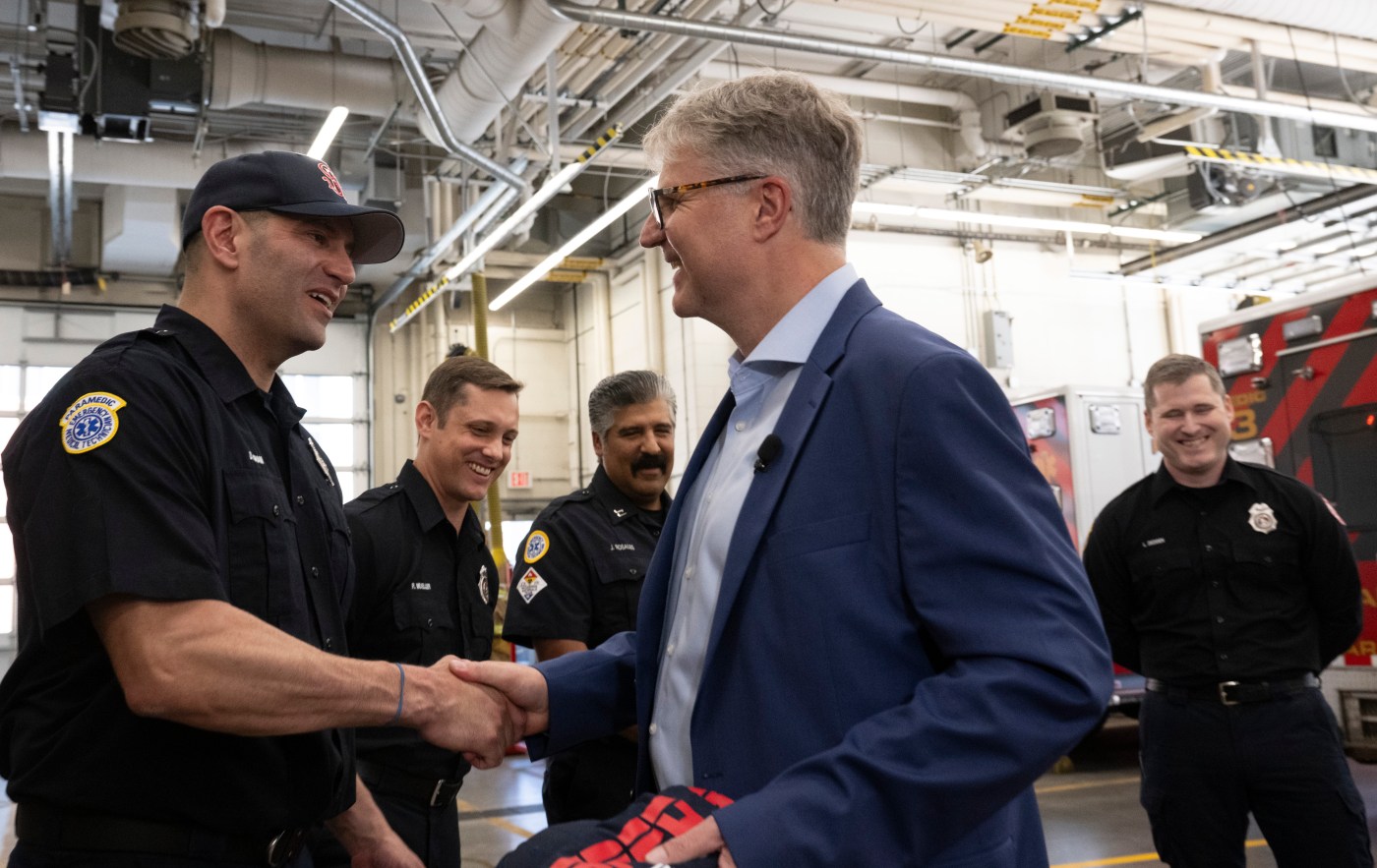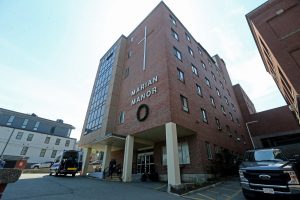
‘You saved my life,’ German 3M manager tells St. Paul firefighters who treated him last visit
At a downtown St. Paul fire station Tuesday, Robert Peez shook hands with a line of firefighter/EMTs and paramedics, who each clapped him on the back.
When they first met in October, he was unconscious. He’d had a massive heart attack at age 54.
“You saved my life,” he told the firefighters and M Health Fairview University of Minnesota Medical Center staff as he met with them Tuesday to thank them.
Each year in the U.S., more than 356,000 people go into cardiac arrest while not in the hospital and 60 percent to 80 percent of them die before making it to the hospital, according to the Centers for Disease Control and Prevention.
Peez, who lives in Landsberg, Germany, near Munich, worked for Maplewood-based 3M Co. for more than 20 years. He’s a global lab manager for Solventum, which spun off from 3M. At home, he’s a volunteer firefighter.
In October, Peez arrived in Minnesota for a business trip. After a long and stressful day of traveling, he checked into his hotel in downtown St. Paul in the evening. In his hotel room, Peez started feeling a slight pain in his chest, which he hadn’t experienced before. On a scale of one to 10, he said it was a three or four.
“But the pain just didn’t go away,” he said, and he started Googling. He read about signs of a potential heart attack. He took one of his business cards and wrote his supervisor’s name and phone number on the back, and then went to the lobby.
Peez told an employee at the front desk he was having chest pain and asked if he could call an ambulance. The worker told Peez that paramedics would be there quickly. That’s the last thing he remembers before waking up in a hospital room.
Coordinated response ‘like a pit crew’
Logan Dedden, the primary medic who responded, found Peez unconscious on the ground with no pulse. “He was a gray color we don’t like to see,” Dedden said.
They gave him CPR, used a defibrillator, and provided him with oxygen and medication to get his heart pumping again. They called ahead to University of Minnesota Medical Center-East Bank, where they rushed him.
“We felt very much like a pit crew,” said Capt. Joaquin Rosales of how they worked together to help Peez. Along with him and Dedden on the call was firefighter/EMT John Vitale, firefighter/medic Derek Isham, firefighter/EMT Ryan Mueller and fire equipment operator/paramedic Patrick Conner.
Dr. Dan Popa, a physician in the hospital’s emergency room, said a lot of credit goes to the paramedics and EMTs. “Without that, for sure you wouldn’t have made it,” he told Peez.
Registered nurses Alexia Gallegos and Samantha Cardenas, who were among those who visited the fire station Tuesday, remember the urgency of providing care to Peez.
“Robert was a very sick man when EMS brought him in,” Gallegos said.
Related Articles
Could better inhalers help patients, and the planet?
There’s a new highly transmissible COVID-19 variant. Could FLiRT lead to a summer uptick?
New device could identify which babies will struggle with breastfeeding
Outgoing CEO of Rise spent 45 years helping expand employment for people with disabilities
Breakthrough therapies are saving lives. Can we afford them?
Peez had a pulse again, but it was weak, and an electrocardiogram showed signs that Peez’s “heart muscle cells basically were screaming out for oxygen and starting to die,” said Popa, who stabilized Peez before he was sent to the hospital’s cardiac catheterization laboratory. The hospital aims to get cardiac patients there within 60 minutes and “the quicker the better,” Popa said.
In a large artery, cardiologists put in two stents and later added a smaller stent.
Peez’s supervisor (the one whose information he wrote on his business card) was at the hospital when he regained consciousness and told him he’d had a heart attack. Other colleagues also looked after him, including bringing him homecooked meals.
A rewarding reunion
Robert Peez, left, thanks emergency room caregivers Dr. Dan Dopa, shaking hands with Peez, and registered nurses Alexia Gallegos and Samantha Cardenas. (John Autey / Pioneer Press)
While people may be hesitant to get medical attention when they have chest pain, Popa said the onset of chest pain in someone who’s middle-aged or older “is very, very concerning and definitely a reason to start seeking medical care.”
Peez said he hadn’t had previous heart problems. He changed his lifestyle after his heart attack — he stopped drinking soda, started eating more salads and healthier foods, and began going on walks. He’s lost about 26 pounds.
Firefighters and medical staff don’t usually get to meet people they helped.
“These folks go on a ton of calls and not all of them are this positive,” Assistant Fire Chief Steve Sampson told Peez. “It’s really rewarding for us to meet you and to think about your family at home and your friends being able to enjoy you for a long time to come. ”
Peez, who is again in Minnesota for work, sent regards from his wife, Monika, and 19-year-old daughter.
Popa said he jokes with patients that he hopes he’ll never see them again, because he doesn’t want them having to come back to the ER. But it was special “to get to see someone like Robert,” he said. “The whole system combined and everybody’s efforts together saved his life.”
Related Articles
St. Paul copper wire thief gets probation for latest caper
Anderson, Lunneborg, Donaldson: State law needs a tweak this year so Lakeview Hospital project can proceed
Open house Tuesday: MnDOT plans two road projects along St. Paul’s Snelling Avenue this summer
Former St. Paul charter school substitute teacher charged with classroom sexual misconduct with student
Boyfriend of former St. Kate’s dean also now faces charges of swindling $400K from the school


